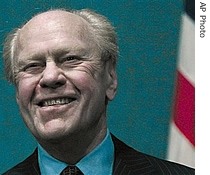2006年VOA标准英语-Former US President Gerald R. Ford Dies at 93(在线收听)
By Jim Malone
Washington
27 December 2006
Watch Gerald Ford report
Former President Gerald Ford, who healed a divided nation in the wake of President Richard Nixon's resignation and the Watergate scandal, has died in the U.S. state of California at the age of 93. He had battled pneumonia and undergone two heart procedures earlier this year. VOA National correspondent Jim Malone has a look back at Gerald Ford's life and legacy from Washington. Mil Arcega narrates.
The 38th President of the United States came from a humble background. Born Leslie King in Nebraska in 1913, Gerald Ford took on the name of his stepfather after his biological parents divorced just a few years after his birth.

Gerald R. Ford (File)
He moved with his mother to Grand Rapids, Michigan, and became a football star at the University of Michigan in the mid-1930s.
Gerald Ford served in the U.S. Navy during World War II, after attending Yale University Law School, and then won his first race for Congress in 1948.
Mr. Ford became the leader of Republicans in the House of Representatives in 1965 and developed a reputation as a conservative on budget issues but a moderate on social and foreign policy issues.
It was his popularity among both Republicans and Democrats in Congress that led then President Richard Nixon to choose him as vice president following the resignation of Vice President Spiro Agnew in 1973.
"Gerald Ford was perhaps not Nixon's first choice, but he was certainly his first choice that could have been easily confirmed by the Congress," said Stephen Hess, a political expert at the Brookings Institution in Washington. "And that is how really he got to be ultimately the first president who was neither elected vice president nor president."
Gerald Ford's tenure as vice president lasted only 10 months.
In August, 1974, Richard Nixon became the first U.S. president to resign after the public became convinced of his involvement in the Watergate scandal. "Therefore, I shall resign the presidency effective at noon tomorrow," he said. "Vice President Ford will be sworn in as President, at that hour, in this office."
In his first statement to the American people as president, Gerald Ford immediately set about the task of healing the nation's political wounds in the wake of Watergate.
"My fellow Americans, our long national nightmare is over," he said. "Our Constitution works. Our great republic is a government of laws and not of men. Here, the people rule. As we bind up the internal wounds of Watergate, more painful and more poisonous than those of foreign wars, let us restore the Golden Rule to our political process and let brotherly love purge our hearts of suspicion and of hate."
"What he did was bring a calm to tumultuous times, a personal integrity that just shined from the man and really it was a way of tamping down what could have been a very mean, very unpleasant post-Nixon era," said political analyst Stephen Hess.
One month after his swearing-in, Gerald Ford decided to pardon Richard Nixon for any crimes he may have committed in connection with the Watergate scandal. The pardon meant the former president could not be criminally prosecuted and was welcomed by Nixon loyalists but condemned by Democrats.
Public reaction to the Nixon pardon was overwhelmingly negative. In fact, President Ford took the unusual step of defending the pardon before a congressional committee. "He is the only President in the history of this country who has resigned in shame and disgrace," he said. "I think that, in and of itself, can be understood, can be explained, to uh, students or to others."
Political expert Stephen Hess says the Nixon pardon probably cost Gerald Ford the 1976 election.
"And the irony of that is that it probably defeated him when he ran for president in 1976. It was a very controversial move. It was absolutely the right move," he said. "I thought so at the time, although many did not. But I think most people feel it now, that it prevented a long, long period of great pain if a president had actually been tried in a court of law."
Despite the controversy over the pardon, Gerald Ford steadily gained in the polls during his 1976 presidential election matchup with Democrat Jimmy Carter.
But his momentum stalled after a presidential debate in which he suggested that Eastern Europe was not under the thumb of the Soviet Union. "There is no Soviet domination of Eastern Europe," he said.
Mr. Ford narrowly lost the 1976 election. During his brief presidency, the country dealt with rising inflation and the divisive end of the Vietnam War. His main foreign policy achievements included continuing the policy of detente with the Soviet Union and completion of the Helsinki agreements on human rights principles and East European national boundaries.
After he left the White House, Gerald Ford moved to California and became a regular on the lecture and speech circuit.
"His legacy was important in allowing the nation to get over a very rough period of time and move forward with some dispatch and some real civility," said Stephen Hess. "He was a decent man, an honorable man when the nation really did need a person like that."
In 1999, Mr. Ford was honored at the White House by President Clinton and awarded the Presidential Medal of Freedom for his efforts to heal the nation in the wake of Watergate.